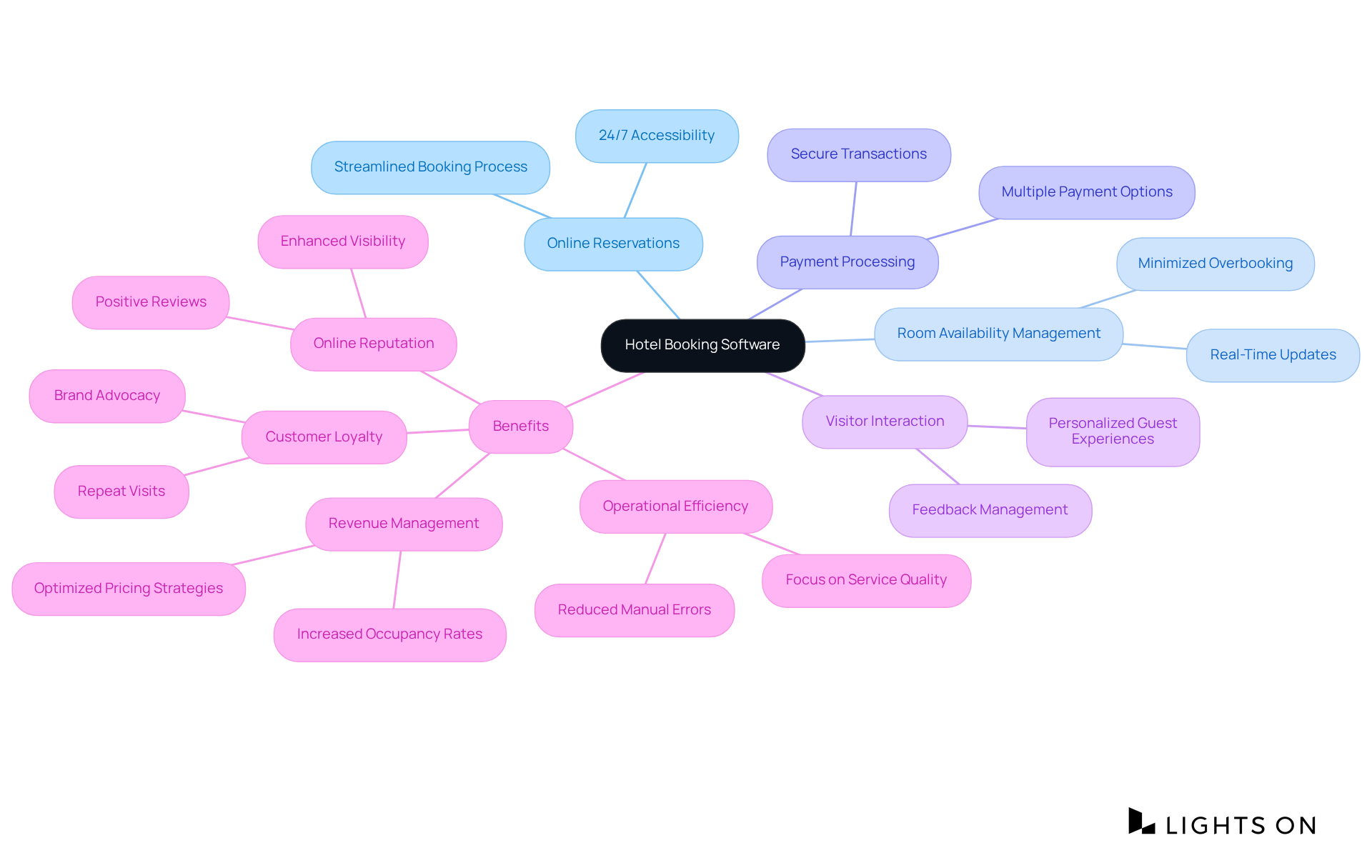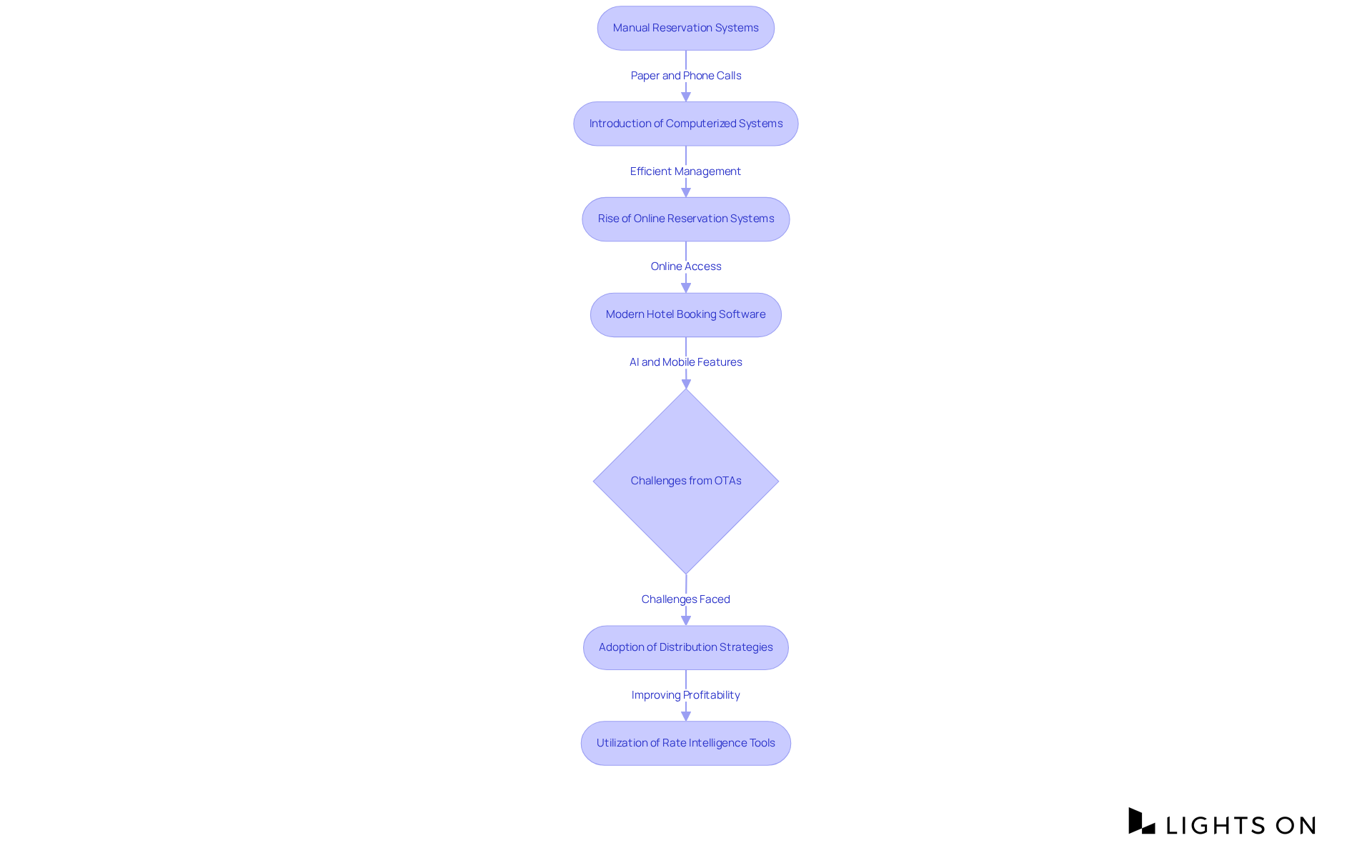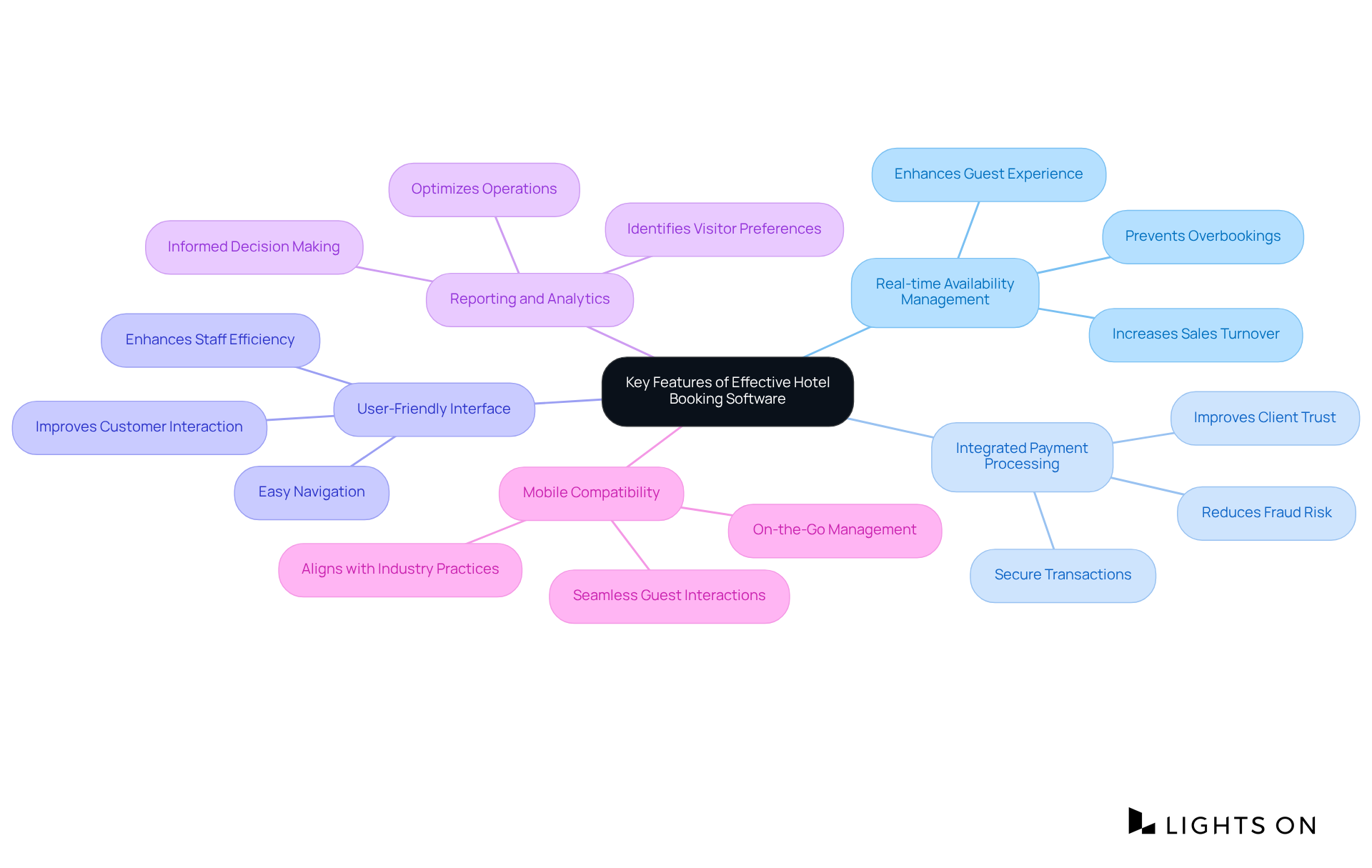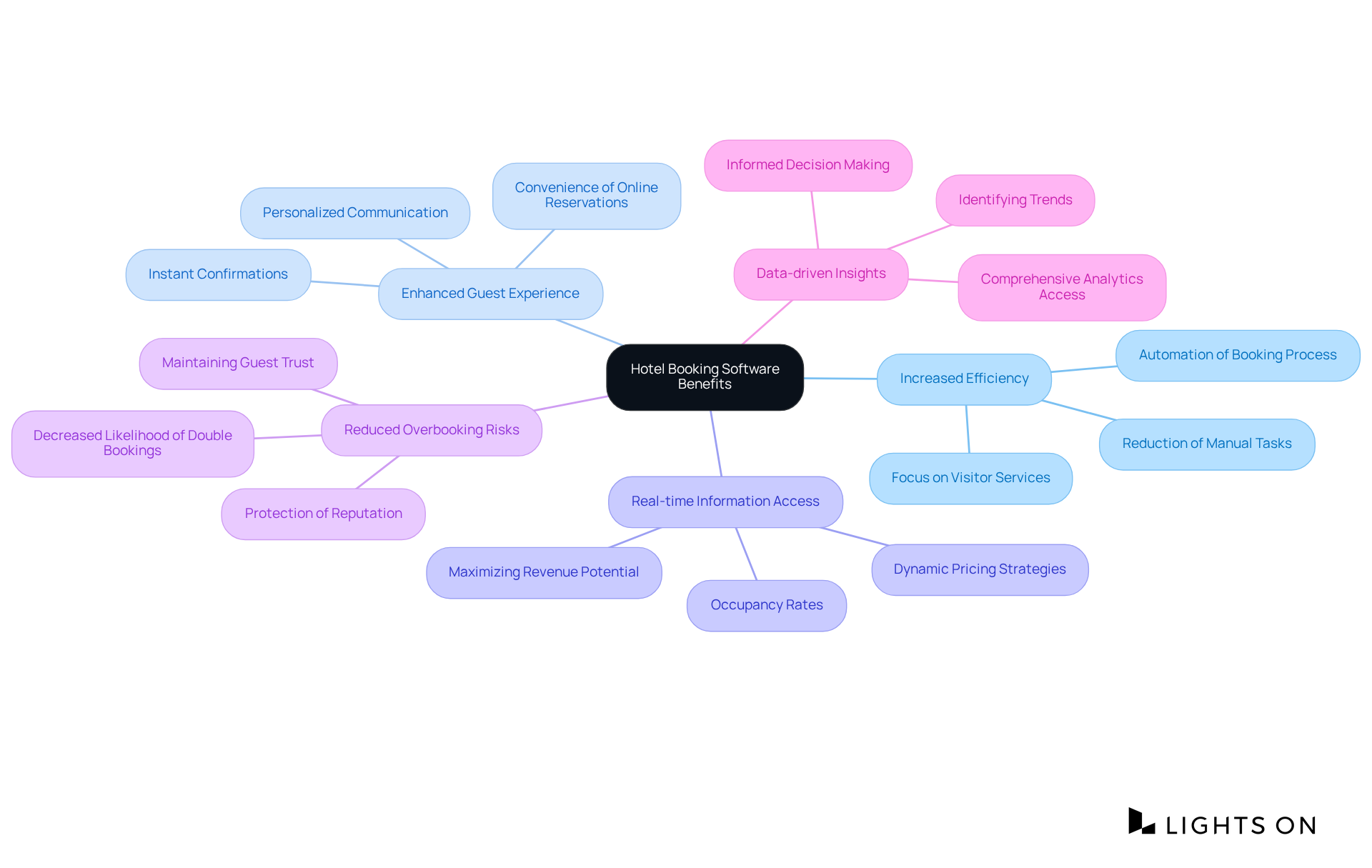Hotel booking software plays a crucial role in modern hospitality management, streamlining operations and enhancing guest experiences while improving revenue management. Its key functions, such as:
significantly reduce manual errors. Furthermore, these features foster customer loyalty through personalized services. Ultimately, this positions hotels for success in an increasingly competitive market.
Hotel booking software has emerged as a cornerstone of the hospitality industry, fundamentally transforming how accommodations manage reservations and enhance guest interactions. By streamlining operations, this technology minimizes manual errors and elevates the overall visitor experience, positioning itself as an indispensable tool for modern hotels. However, as the travel landscape continues to evolve, establishments must consider how to fully leverage these systems—not merely to survive, but to thrive amidst increasing competition and shifting consumer expectations.
Hotel booking software serves as a vital online platform for managing reservations, inventory, and visitor interactions within accommodations and other lodging facilities. Their primary features include enabling online reservations, managing room availability, processing payments, and providing real-time updates to both visitors and staff. The significance of this hotel booking software is underscored by its ability to streamline operations, minimize manual errors, and significantly enhance the overall visitor experience, establishing it as an indispensable asset in modern hospitality management.
The benefits of utilizing accommodation reservation software extend beyond mere operational efficiency. By automating processes, hotels can focus on delivering exceptional service, which is crucial for fostering customer loyalty. Industry insights reveal that retaining existing customers is often more advantageous than acquiring new ones, as loyal patrons act as brand advocates. This application not only improves reservation accuracy but also facilitates personalized guest experiences, leading to increased satisfaction and repeat visits.
The successful implementation of hotel booking software can revolutionize an establishment's operational framework. For instance, accommodations that leverage such technology frequently report improved revenue management and enhanced visibility in a competitive landscape. By integrating hotel booking software with additional digital marketing strategies, these establishments can optimize their pricing and promotional initiatives, ultimately boosting occupancy rates. Lights On, for example, has experienced an average year-over-year revenue growth of 47%, exemplifying the positive effects of effective technology integration in the hospitality sector.
Integrating technology into hospitality management is not solely about efficiency; it’s about creating memorable experiences for visitors. As one industry leader aptly stated, 'Success is unavoidable when every facet of your establishment is the best that it can be.' This sentiment captures the of hotel booking software in enhancing service quality and visitor satisfaction, making it an essential resource for any modern lodging professional. Furthermore, managing online reputation is critical in the hospitality industry, as positive reviews can attract new clients and enhance visitor experiences. By utilizing accommodation reservation tools, establishments can boost their online visibility and respond to visitor feedback, ultimately cultivating loyalty and revenue.

The development of lodging reservation software has its roots in the early days of manual reservation systems, which were heavily reliant on paper and phone calls. As technology advanced, the introduction of computerized systems in the late 20th century marked a significant transformation, allowing for more efficient management of reservations. The rise of the internet in the 1990s further revolutionized the landscape, leading to the establishment of online reservation systems that empowered visitors to secure accommodations directly through lodging websites. Today, sophisticated hotel booking software incorporates artificial intelligence, real-time data analytics, and mobile functionalities, becoming an indispensable tool for enhancing guest experiences and .
However, accommodations face considerable challenges from online travel agencies (OTAs), including steep commission rates and difficulties in maintaining rate parity. To effectively navigate these complexities, it is crucial for accommodations to adopt a profitable distribution strategy that adapts dynamically on a channel-by-channel basis. Furthermore, utilizing rate intelligence tools and parity management can aid establishments in fine-tuning their pricing strategies and boosting profitability. Historical case studies exemplify how these technological advancements have reshaped the industry, underscoring the necessity of adapting to ongoing changes and selecting the right Property Management System (PMS) to stay competitive in an ever-evolving market.

Effective hotel booking software includes several essential features that significantly enhance operational efficiency and guest satisfaction.
These attributes together enhance the effectiveness of accommodations and significantly elevate the overall visitor experience, rendering them essential in today's competitive hospitality environment.

The implementation of hotel booking software offers numerous significant benefits that can transform hotel operations and enhance guest satisfaction.
Increased efficiency can be achieved by using hotel booking software, as the automation of the booking process streamlines operations and drastically reduces the time spent on manual tasks. This allows staff to focus more on visitor services, ultimately enhancing the overall quality of service offered.
Enhanced Guest Experience: Guests enjoy the convenience of online reservations made through hotel booking software, instant confirmations, and personalized communication. This seamless experience leads to heightened satisfaction levels and encourages . As Maura Valentine aptly notes, "By offering a simple, user-friendly reservation experience on your accommodation’s site, a reservation system motivates guests to reserve directly instead of via third-party online travel agencies (OTAs)."
Hotel booking software provides access to real-time information regarding occupancy rates and pricing strategies, empowering establishments to dynamically adjust their offerings and maximize revenue potential. For instance, direct bookings through an accommodation reservation system eliminate third-party fees, which can reach as high as 30% per room. Hotels that have adopted hotel booking software report significant increases in direct bookings, thereby reducing reliance on external platforms.
Reduced Overbooking Risks: Hotel booking software substantially decreases the likelihood of double bookings, thereby protecting the establishment's reputation and maintaining guest trust. This reliability is essential in a competitive market where guest expectations are elevated.
Data-driven insights from hotel booking software provide comprehensive analytics access that enables managers to make informed decisions regarding marketing strategies and operational improvements. By leveraging these insights, accommodations can identify trends and optimize their services accordingly. The success of Lights On's services is exemplified by Markus Schale, General Manager of Hotel Wailea, who highlighted the company's ability to surpass revenue expectations and enhance brand visibility following renovations.
In conclusion, hotel booking software transcends being merely a tool; it is a strategic asset that significantly enhances an establishment's operational capabilities and guest satisfaction. The integration of such technology is imperative for modern hotels seeking to thrive in a competitive landscape.

Hotel booking software transcends mere modern convenience; it stands as a vital element of effective hospitality management that significantly enhances operational efficiency and guest satisfaction. By automating the reservation process and providing real-time data, this technology empowers hotels to elevate service delivery while minimizing errors, ultimately fostering a more enjoyable experience for guests.
This article underscores several key aspects of hotel booking software, including its essential functions such as real-time availability management, integrated payment processing, and user-friendly interfaces. Furthermore, it emphasizes the substantial benefits arising from its implementation, including increased operational efficiency, enhanced guest experiences, and improved revenue management. These insights highlight the transformative potential of hotel booking software, as evidenced by the success stories of establishments that have embraced these systems.
In a fiercely competitive hospitality landscape, the integration of advanced booking software is imperative for hotels aspiring to thrive. Embracing this technology not only streamlines operations but also positions accommodations to meet and exceed guest expectations, ultimately driving loyalty and profitability. As the industry continues to evolve, leveraging the capabilities of hotel booking software will be essential for any establishment seeking to secure its place in the market.
What is hotel booking software?
Hotel booking software is an online platform used for managing reservations, inventory, and visitor interactions within accommodations and lodging facilities.
What are the primary functions of hotel booking software?
The primary functions include enabling online reservations, managing room availability, processing payments, and providing real-time updates to both visitors and staff.
Why is hotel booking software important in the hospitality industry?
It streamlines operations, minimizes manual errors, and enhances the overall visitor experience, making it an essential asset for modern hospitality management.
How does hotel booking software improve customer service?
By automating processes, hotels can focus on exceptional service, which fosters customer loyalty and improves reservation accuracy, leading to personalized guest experiences.
What are the benefits of retaining existing customers over acquiring new ones?
Retaining existing customers is often more advantageous because loyal patrons can act as brand advocates, which helps in building a strong reputation.
How can hotel booking software impact revenue management?
Successful implementation of hotel booking software can lead to improved revenue management and enhanced visibility in a competitive landscape, optimizing pricing and promotional initiatives.
Can you provide an example of a successful integration of hotel booking software?
Lights On has experienced an average year-over-year revenue growth of 47%, highlighting the positive effects of effective technology integration in the hospitality sector.
What role does online reputation management play in hospitality?
Managing online reputation is critical as positive reviews can attract new clients and enhance visitor experiences. Accommodation reservation tools help boost online visibility and enable establishments to respond to visitor feedback.
How does hotel booking software contribute to creating memorable experiences for visitors?
It enhances service quality and visitor satisfaction, making it an essential resource for lodging professionals aiming to provide exceptional experiences.
Transform your group booking strategies with Lights On and watch your occupancy soar.